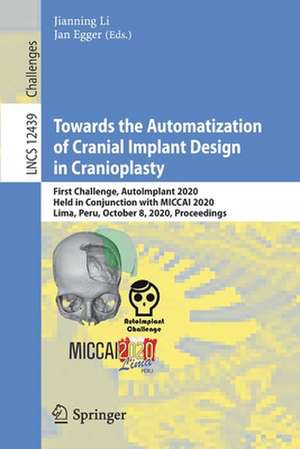Towards the Automatization of Cranial Implant Design in Cranioplasty: First Challenge, AutoImplant 2020, Held in Conjunction with MICCAI 2020, Lima, Peru, October 8, 2020, Proceedings: Lecture Notes in Computer Science, cartea 12439
Editat de Jianning Li, Jan Eggeren Limba Engleză Paperback – 29 noi 2020
Din seria Lecture Notes in Computer Science
- 20%
 Preț: 1061.55 lei
Preț: 1061.55 lei - 20%
 Preț: 307.71 lei
Preț: 307.71 lei - 20%
 Preț: 438.69 lei
Preț: 438.69 lei - 20%
 Preț: 579.30 lei
Preț: 579.30 lei -
 Preț: 410.88 lei
Preț: 410.88 lei - 17%
 Preț: 427.22 lei
Preț: 427.22 lei - 20%
 Preț: 596.46 lei
Preț: 596.46 lei - 15%
 Preț: 448.04 lei
Preț: 448.04 lei - 20%
 Preț: 353.50 lei
Preț: 353.50 lei -
 Preț: 389.49 lei
Preț: 389.49 lei - 20%
 Preț: 309.90 lei
Preț: 309.90 lei - 20%
 Preț: 645.28 lei
Preț: 645.28 lei - 20%
 Preț: 763.23 lei
Preț: 763.23 lei - 15%
 Preț: 580.46 lei
Preț: 580.46 lei - 20%
 Preț: 310.28 lei
Preț: 310.28 lei - 20%
 Preț: 655.02 lei
Preț: 655.02 lei - 20%
 Preț: 1183.14 lei
Preț: 1183.14 lei - 20%
 Preț: 340.32 lei
Preț: 340.32 lei -
 Preț: 449.57 lei
Preț: 449.57 lei - 20%
 Preț: 591.51 lei
Preț: 591.51 lei - 18%
 Preț: 938.83 lei
Preț: 938.83 lei - 20%
 Preț: 337.00 lei
Preț: 337.00 lei - 20%
 Preț: 649.50 lei
Preț: 649.50 lei - 20%
 Preț: 607.40 lei
Preț: 607.40 lei - 20%
 Preț: 1414.79 lei
Preț: 1414.79 lei - 20%
 Preț: 1024.44 lei
Preț: 1024.44 lei - 20%
 Preț: 583.40 lei
Preț: 583.40 lei - 20%
 Preț: 453.32 lei
Preț: 453.32 lei - 20%
 Preț: 575.49 lei
Preț: 575.49 lei - 20%
 Preț: 1075.26 lei
Preț: 1075.26 lei - 20%
 Preț: 585.88 lei
Preț: 585.88 lei - 20%
 Preț: 825.93 lei
Preț: 825.93 lei - 17%
 Preț: 360.20 lei
Preț: 360.20 lei - 20%
 Preț: 763.23 lei
Preț: 763.23 lei - 20%
 Preț: 340.32 lei
Preț: 340.32 lei - 20%
 Preț: 504.58 lei
Preț: 504.58 lei - 20%
 Preț: 369.13 lei
Preț: 369.13 lei - 20%
 Preț: 580.93 lei
Preț: 580.93 lei - 20%
 Preț: 343.62 lei
Preț: 343.62 lei - 20%
 Preț: 350.21 lei
Preț: 350.21 lei - 20%
 Preț: 583.40 lei
Preț: 583.40 lei - 20%
 Preț: 583.40 lei
Preț: 583.40 lei - 15%
 Preț: 438.59 lei
Preț: 438.59 lei - 20%
 Preț: 341.95 lei
Preț: 341.95 lei - 20%
 Preț: 238.01 lei
Preț: 238.01 lei - 20%
 Preț: 538.30 lei
Preț: 538.30 lei
Preț: 324.31 lei
Preț vechi: 405.39 lei
-20% Nou
Puncte Express: 486
Preț estimativ în valută:
62.06€ • 67.39$ • 52.13£
62.06€ • 67.39$ • 52.13£
Carte tipărită la comandă
Livrare economică 22 aprilie-06 mai
Preluare comenzi: 021 569.72.76
Specificații
ISBN-13: 9783030643263
ISBN-10: 3030643263
Pagini: 115
Ilustrații: XVI, 115 p. 76 illus., 72 illus. in color.
Dimensiuni: 155 x 235 mm
Greutate: 0.2 kg
Ediția:1st ed. 2020
Editura: Springer International Publishing
Colecția Springer
Seriile Lecture Notes in Computer Science, Image Processing, Computer Vision, Pattern Recognition, and Graphics
Locul publicării:Cham, Switzerland
ISBN-10: 3030643263
Pagini: 115
Ilustrații: XVI, 115 p. 76 illus., 72 illus. in color.
Dimensiuni: 155 x 235 mm
Greutate: 0.2 kg
Ediția:1st ed. 2020
Editura: Springer International Publishing
Colecția Springer
Seriile Lecture Notes in Computer Science, Image Processing, Computer Vision, Pattern Recognition, and Graphics
Locul publicării:Cham, Switzerland
Cuprins
Patient Specific Implants (PSI): Cranioplasty in the Neurosurgical Clinical Routine.- Dataset Descriptor for the AutoImplant Cranial Implant Design Challenge.- Automated Virtual Reconstruction of Large Skull Defects using Statistical Shape Models and Generative Adversarial Networks.- Cranial Implant Design through Multiaxial Slice Inpainting using Deep Learning.- Cranial Implant Design via Virtual Craniectomy with Shape Priors.- Deep Learning Using Augmentation via Registration: 1st Place Solution to the AutoImplant 2020 Challenge.- Cranial Defect Reconstruction using Cascaded CNN with Alignment.- Shape Completion by U-Net: An Approach to the AutoImplant MICCAI Cranial Implant Design Challenge.- Cranial Implant Prediction using Low-Resolution 3D Shape Completion and High-Resolution 2D Refinement.- Cranial Implant Design Using a Deep Learning Method with Anatomical Regularization.- High-resolution Cranial Implant Prediction via Patch-wise Training.- Learning Volumetric Shape Super-Resolution for Cranial Implant Design.
